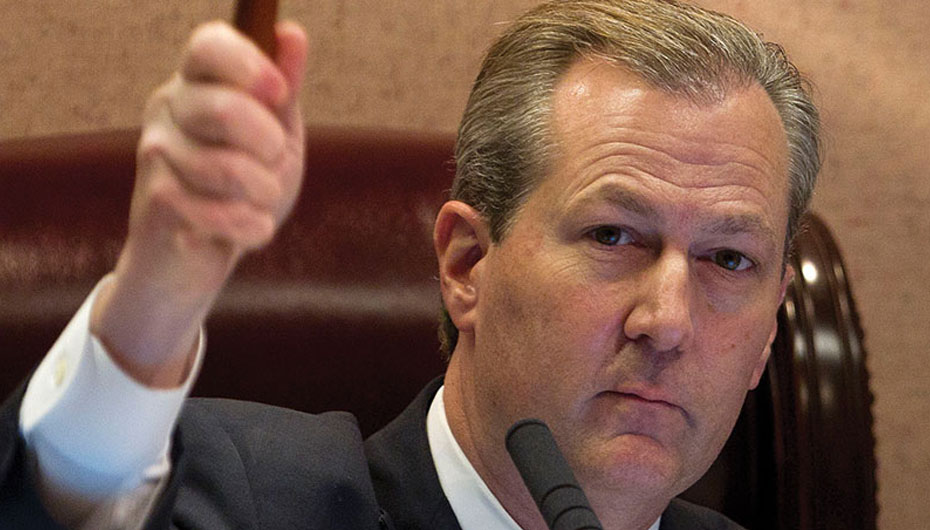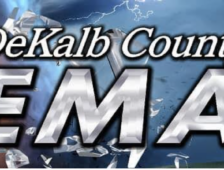By Tyler Pruett
OPELIKA, Ala. — Today marked the tenth day in the ethics trial of Alabama House Speaker Rep. Mike Hubbard. The prosecution rests its case yesterday, after calling some of the state’s most prominent figures in both politics and business to the stand. Speaker Hubbard stands trial for 23 felony charges of violation of state ethics laws. Today was also the first day of testimony on behalf of the defense. Hubbard himself would be the first of those testimonies.
The prosecution seeks to make the case that Hubbard used his political position to generate clients and income for his consulting and printing businesses. Under state ethics laws, it’s illegal for public officials to use their position for financial advantage or to accept money from lobbyists or entities who employ lobbyist. The defense now seeks to prove that Hubbard’s action were exempt under Section 36-25-1(33) of the state’s ethics laws, which allows for an exemption if the business contribution was from a friend or someone who had a prior relationship with the official in question.
Late last week, the prosecution called Governor Robert Bentley to the stand. Testifying for 20 minutes, the governor was asked questions regarding Hubbard’s role in recruiting businesses to Southeastern Alabama in 2012 - 2013. While recruiting these businesses, Hubbard’s consulting firm was being paid in excess of $200,000 by the Southeast Alabama Gas District (SEAGD) for industrial development in the area.
While recruiting industry to the state is a responsibility of politicians, the prosecution contends that this was not for the taxpayers, but for financial gain. Hubbard was successful in recruiting an aerospace company to the Dothan Airport after attending the Paris Airshow in 2013, a trip paid for by SEAGD, and not the taxpayers.
Bentley, who faces his own political problems, was mostly questioned on what capacity Hubbard was acting. According to Al.com, Bentley responded that he did believe he was acting in his capacity as speaker, and that Hubbard’s actions were, “in the best interest of the state.”
After Bentley’s testimony, the defense called witnesses regarding investments into a company, Craftmaster printing, which is partly owned by Hubbard. The printing company was facing bankruptcy without an outside investment. Emails between Hubbard and business contacts were submitted by the prosecution as evidence, and much of the state’s case is based upon these conversations.
These emails, obtained and posted online by John Archibald of Al.com, show that Hubbard was worried about his income after being laid off from his job with a media group. The speaker sought advice from Will Brooke, a Birmingham business executive on how to replace his lost income and save his failing business.
The emails indicate that Hubbard solicited Brooke several times, who finally devised a plan to raise $1.5 million in investments for Craftmaster, and would become one of these investors. Hubbard repeatedly mentioned his political position, and even threatened to quit his position due to loss of income.
“It is amazing, and quite disappointing, that after the sacrifices I’ve made personally and professionally to finally get Alabama a pro-business legislature, no one in the business community is willing to work with me professionally to keep me there. Maybe I’m too much of a lightening rod,” Hubbard said in a 2012 email to Brooke.
Brooke’s response seemed to indicate that he knew the implications of what Hubbard was asking.
“No, Mike, that’s not it. I think that folks are afraid to mess up, on either their or your side of the equation.” Brooke said.
Four of the ten investors in Craftmaster printing, including Brooke, were executives of businesses that employed lobbyists and the prosecution contends violates state ethics laws. Each of these four investors testified, and in each cross examination by the defense, a case was made that these were “friends” of Hubbard’s.
Last Friday, former Governor Bob Riley was called to the stand. Riley started his own lobbying firm, Bob Riley and Associates in 2011. The state has brought into question a series of emails between Hubbard and Riley around that time. Like the emails with Brooke, Hubbard was lamenting the loss of his job and income.
“I need to be a salesman for Bob Riley and Associates,” Hubbard said in one email to Riley.
The email exchange reflects that Riley and Hubbard discussed business, which would be illegal as Riley is a registered lobbyist. The speaker also seems to direct Riley to clients. The former governor maintained that these were conversations between friends, not business dealings.
“They’re just conversations about what I’m doing and what he’s doing,” Riley said in testimony.
On the first day of testimony called by the defense, Hubbard himself was the first to take the stand. The speaker denied unethically using his position for personal gain, claiming that he had consulted the ethics commission prior to accepting investments or contracts for his business. Hubbard explained his feelings while writing the emails that have now been entered into evidence.
“I was obviously pouring out my soul in the emails,” Hubbard said. “You never think the government is going to get your emails and put them out on the internet.”
Whether these emails were an unethical mix of business and politics or a correspondence between old friends will be up to a Lee County jury. The prosecution rests that Hubbard generated a total of $2.38 million illegally for his businesses. It will now be up to the defense to convince the jury that Hubbard just needed help from friends in high places.





